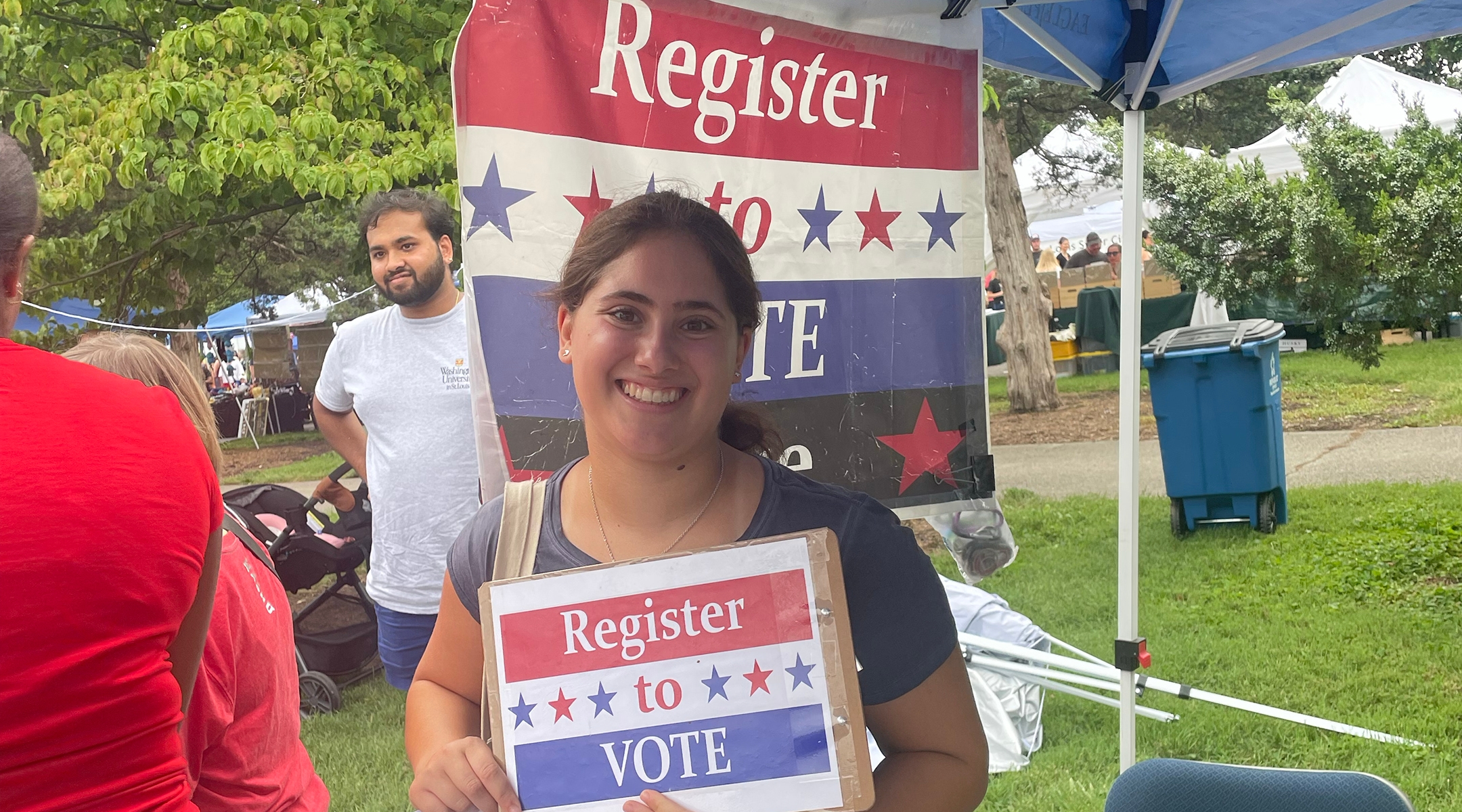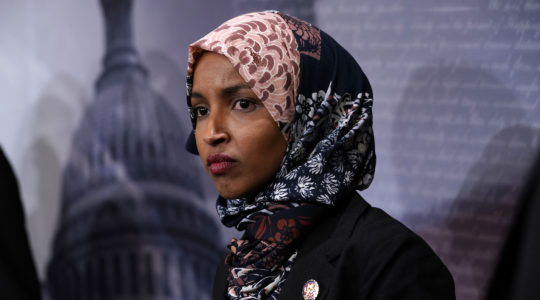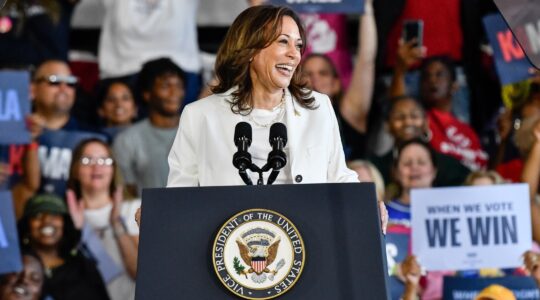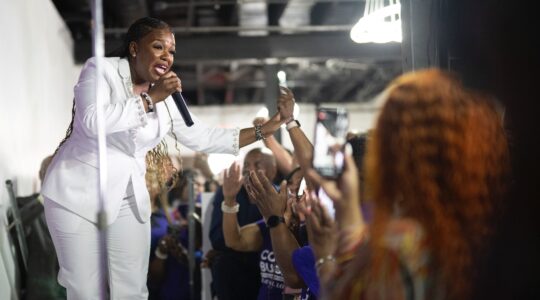This article was produced as part of JTA’s Teen Journalism Fellowship, a program that works with Jewish teens around the world to report on issues that affect their lives.
If anyone had asked Chloe Hockfield last Oct. 6 whose name she would check off on her first presidential ballot, she would have answered firmly.
Now, as the United States inches closer to the November 2024 election, Hockfield’s first, she is not so certain. The catalyst: a war taking place thousands of miles away from her Pennsylvania home to which she feels such a connection that it may just tip her ballot in the critical swing state.
“Altogether, I feel like Trump is not a good person and should not be president, even though I support his stance on Israel and the war,” said Hockfield. “I was planning on voting for [Biden] before the war, and it definitely changed how strongly I feel about him. Before I guess I was 100% Biden, but I definitely did question — ‘should I be voting for Trump to support the Jewish people?’”
When Hamas launched its deadly attack on southern Israel on Oct. 7, it focused attention on young people’s place in the shaping and outcome of the presidential race. With the 2024 election once again expected to be razor-thin, the votes of young people are becoming increasingly coveted by campaigns up and down the ballot.
President Joseph Biden is seen to be underperforming among young voters, especially over his support for Israel in its war on Gaza. In NPR/PBS NewsHour/Marist survey taken May 21-13, voters 18-29 were the most likely of any age group to say the U.S should increase humanitarian aid to Palestinians and should cut off all support for Israel until there is a ceasefire.
Meanwhile, some Jewish teens are leaning in the exact opposite direction. Despite Biden’s consistent support for Israel in the form of military aid, even some liberal-leaning Jewish teens have begun to question their loyalty towards him due to this issue, including Hockfield. Biden’s threat to halt some shipments of American weapons to Israel, when coupled with Trump’s support for Israel — his administration moved the U.S. embassy to Jerusalem and brokered the Abraham Accords between Israel and former Arab antagonists — has led some Jewish teens to question the typical liberal leanings of their demographic.
“I’m still debating which side to choose,” says Noya Chirashnya, a first-time, 18-year old Jewish voter from California, “primarily because Trump was really good when he was in office about his relations with Israel. That’s why I’ve been going back and forth because, on one hand, domestically, Trump wasn’t the best. But, when it came to Israel, he was really strong, and I think at the moment that is more needed.”
Jewish teens’ lack of political certainty following Oct. 7 is not exclusive to the presidential race.
Alex Cohen, an 18-year-old Jew from St. Louis, Missouri, is represented by Rep. Cori Bush, a member of the House’s progressive “Squad.” In November, some 30 St. Louis Jewish leaders criticized Bush in an open letter for her comments on X (formerly Twitter) referring to Israel’s “ethnic cleansing” of Palestinians. The letter described such remarks as antisemitic targeting of Israel.
For Cohen, seeing her local Jewish community come together against the incumbent provoked her to stay away from supporting Bush despite the teen’s Democratic leanings in a conservative state.
“[Bush] was always a little far left for me,” Cohen said, “but especially since she’s been extremely outspoken and anti-Israel and even what some people would describe her pro-Hamas, I definitely will not be voting for her. She’s being primaried by Wesley Bell, and he’s being supported by a lot of Jewish activists.”
Bell, a more moderate Democrat, is challenging Bush in the Aug. 6 Democratic primary. The most recent poll data shows Bell leading Bush by a significant margin of 22%. The former prosecutor has focused parts of his campaign on his support for Israel, saying in a Democratic meeting and voters forum that Bush’s comments about “ethnic cleansing” were “wrong and misguided.” The independent expenditure arm of the American Israel Public Affairs Committee is spending heavily on Ball’s campaign.
“I would not say that I have become a Republican or anything like that, but I feel like also living in Missouri because the state is deep red, gives you a much more pragmatic view on politics [as a liberal],” Cohen said. “You sort of have to do the best with what you have.”
Young Jews may be questioning their political loyalties in the face of rising antisemitism but it is not clear how it will affect their vote come November, says Jacob Schmeltz, co-vice president of the recently formed Jewish on Campus Student Union. The organization, backed by the non-profit Jewish on Campus, is a student-run governing body intended to represent the concerns of Jewish college students throughout the U.S.
“I and many other Jewish students have now seen that our own identities are becoming weaponized for partisan political gain on both sides of the aisle,” says Schmeltz, a recent graduate from Columbia University who was a former organizing fellow with the Jewish Democratic Council of America. “I would be really surprised if the rapid rise in antisemitism we’ve seen since October will have an impact on how us young Jews vote given that many members of Gen Z are still behind the Democratic Party, but perhaps this could be a cause for concern going forward.”
Biden, said Schmeltz, is “a leader in calling out antisemitism and supporting Israel.”
Young Jews, like many young voters, often do not list Israel as a top priority come November. According to a recent Harvard Youth Poll, Americans between the ages of 18 and 29 listed inflation, health care and housing as their top priorities; the Israeli-Palestinian issue ranked 15th out of 16 issues.
And yet, Schemltz says, “the vast majority of young American Jews are horrified by the rise of antisemitism [and] ironclad in their commitment and support for Israel.”
“In American politics, every single race is decided by very thin margins in this era,” Schmeltz says. “So, even though Jews only make up 2% of the American population and Gen Z Jews make up an even smaller amount of that population, we can still be the difference factor in many key states across the country.”
And for some teens that means allaying their concerns about Israel and antisemitism.
“In terms of antisemitism, especially because of how bad it has been on university campuses, working with Congress for a piece of legislation to ensure that certain [antisemitic] things can’t happen on campuses — I definitely think that would change who I would vote for,” said Chirashnya.






